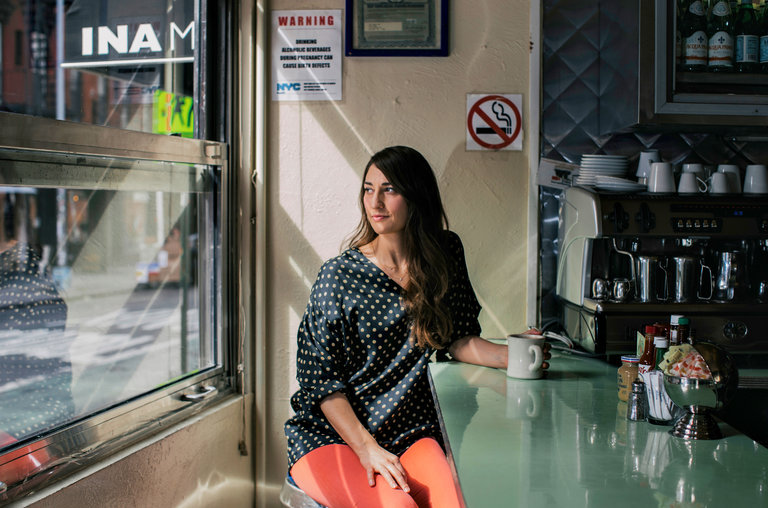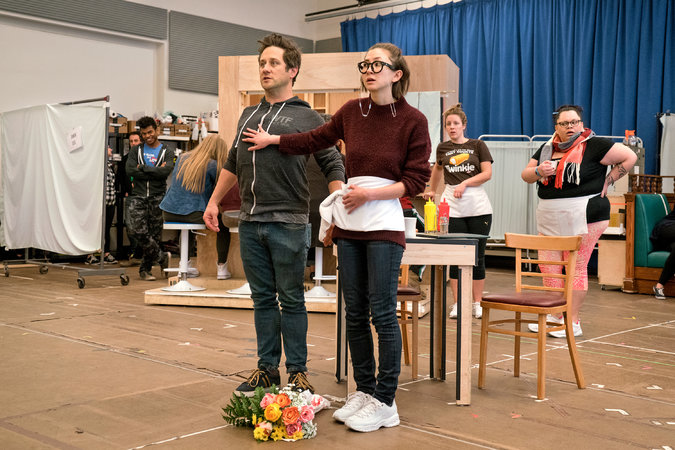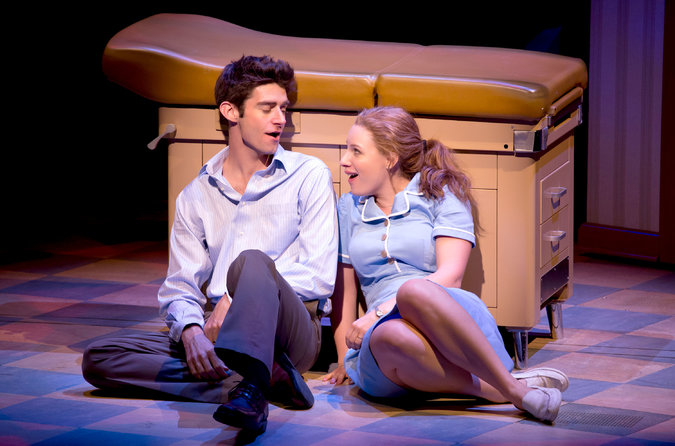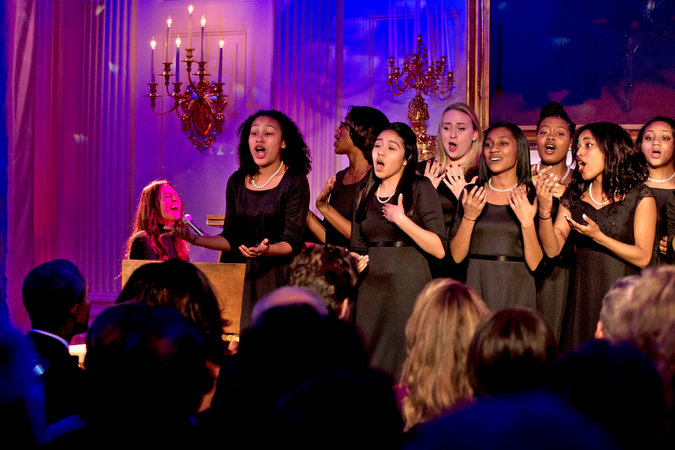“Waitress,” the new Broadway musical based on the 2007 indie movie, is not your typical love story. Set in the South, the plot swirls around a diner waitress and expert pie-baker named Jenna, who, mired in a loveless marriage to an abusive husband and unexpectedly pregnant with his child, embarks on a torrid love affair with her married gynecologist.
Then again, Sara Bareilles is not your traditional Broadway composer.
Ms. Bareilles is the singer-songwriter behind piano-driven hits like “Love Song” and “Brave,” who earlier this month played what she — self-deprecatingly — calls her “mid-tempo ballads” at a White House state dinner honoring the Canadian prime minister.
But she’s also part of a new twist in musical theater: one of a handful of female singer-songwriters attempting to make the leap to Broadway songsmith, along with Edie Brickell, Sheryl Crow, Susan Werner and Erin McKeown.
Writing Broadway musicals, as visitors from the pop, rock, folk and country music worlds are finding, can be a time-consuming and only occasionally lucrative endeavor. And pivoting from the familiar world of composing pop songs to the collaborative craziness of the Broadway musical can induce a sort of cultural whiplash.
“It actually took me a long time to say that I love this project,” Ms. Bareilles said recently, enjoying a glass of pinot grigio after another long day of rehearsal. “It was very hard; it was confusing; it was foreign. I think I was having a little bit of an out-of-body experience with it for maybe the first year of working on this show.”
Yet in a career that has brought her a No. 1 album, five Grammynominations and a celebrity judgeship on the NBC a cappella competition “The Sing-Off,” the 36-year-old Ms. Bareilles said she’s never felt such a sense of reward.
“Some of that is related to the sheer man-hours that it’s required of me,” she said. “I’ve never worked on anything this hard, and this long, and this sincerely.”
The road to Broadway for “Waitress,” which opens April 24 at the Brooks Atkinson Theater, has taken nine years and cost $12 million. The veteran producers Barry and Fran Weissler picked up the theatrical rights to the Adrienne Shelly movie just after its release in 2007, spying musical potential in the imperfections and desires of Ms. Shelly’s characters.
They also saw a project — a mix of feminist fable and romantic fairy tale — that could resonate with women, who drive Broadway sales. Two creative teams didn’t pan out. Soon after hiring the director Diane Paulus, with whom the Weisslers worked on the Tony award-winning revival of “Pippin,” they opted for a different approach.
“It wasn’t this big, bold Broadway musical,” Ms. Paulus said. “This was something more delicate, maybe something that required a new kind of musical theater voice.”
She put together a wish list of songwriters who had never written for the musical theater. The first slot belonged to Ms. Bareilles; Ms. Paulus never talked to anyone else
In Ms. Bareilles’s songs, Ms. Paulus saw both range and a storyteller’s craft — “Gravity” being “a personal, deeply searing heartache of a song,” while “King of Anything” was “spunky with lyrical twists.”
With more Broadway musicals in the works than ever, this behind-the-scenes form of nontraditional casting is becoming increasingly common. “As an industry, we producers are finding that the talent pool of the traditional theater writers — librettists and composers and lyricists — has not really expanded,” said Scott Sanders, the producer of “The Color Purple,” who is considering several female singer-songwriters for an upcoming project.
And with a music business that’s been upended by the Internet, shaving record sales (and those songwriting royalties) by considerable sums, producers are finding those musicians eager for new opportunities.
Ms. Bareilles’s recording and touring career has remained more robust than that of others, but she was ready for a change.
Between touring and shooting “The Sing-Off,” she felt exhausted and overwhelmed, uninspired and too comfortable. “I wasn’t unhappy, but I just felt unalive,” she said. She broke up with a longtime boyfriend, and her longtime band; and she would soon move to New York after 13 years in Los Angeles. Musical theater, she told her agents, was something she’d like to explore.
Ms. Bareilles was first exposed to the form growing up in Eureka, Calif., where her mother and older sisters were involved in community theater. “Nunsense” was among her earliest musical memories — she took up tap dancing because of the show — and she repeatedly listened to cast albums like “Oklahoma!” and “Miss Saigon.” (“I think she knows some musicals better than me,” Ms. Paulus said. “She can sing the whole opening of ‘Beauty and the Beast.’”)
Becoming a pop singer precluded deep theatrical training, and when Ms. Bareilles wrangled an audition for the role of Cinderella in “Into the Woods” at Shakespeare in the Park, she quickly realized that she was underprepared to make the leap to an onstage role. (The part went to Jessie Mueller, who stars as Jenna in “Waitress.”)
Then came the call from Ms. Paulus.
Ms. Bareilles hadn’t seen the movie, but its quirkiness — and the untraditional love story at its heart — appealed to her. “It’s actually about a woman’s seeking to feel like she’s worthwhile in the world,” she said. “So her being seen, truly seen by her love interest, is more about her feeling she matters to the world than just hearing, ‘I love you and want to run away with you.’”
Soon she was immersed in the unfamiliar world of creating a Broadway musical: Telling other people’s stories, rather than her own; writing for multiple characters, sometimes within the same song; crafting musical transitions between scenes.
And, most crucially, Ms. Bareilles had to acclimate to a new way of working.
Collaboration — and trusting outside opinions — has not always come easily to Ms. Bareilles, partly because of some unfortunate experiences with record companies.
“As a writer, I tend to be very protective of my work until it’s completely finished, fleshed out, until I’m ready and willing to go to battle for it,” she said. “That is less helpful in this process, because this show depends on the music serving the book, the book serving the music, the music serving the actors. Everything has its mirror image.”
While she can still feel herself bristle at feedback, she has become less precious about her ideas, especially as she’s become more comfortable with her creative team colleagues, who include the book writer Jessie Nelson. She now understands that they’ll be revisiting everything dozens of times before the show opens.
During a Saturday rehearsal, less than three weeks before the start of previews, one of those changes was being worked out. Since its run last year at the American Repertory Theater in Cambridge, Mass., “Waitress” has been altered considerably. Scenes rewritten, moved and jettisoned, parts recast, rethought and deepened. The biggest difference: a new movement vocabulary from the incoming choreographer Lorin Latarro, which attempts to unlock the fantasy life of Jenna during her pie-making études and to turn a static show into one where the ingredients (the ensemble and band, in particular) literally swirl on stage.
Although the music has changed the least among the creative elements — there’s just one new song — that doesn’t mean Ms. Bareilles’s workload has lightened. Songs have shifted, lyrics have been reworked. And even the smallest staging adjustment can mean a tweak to the music.
After a run-through of “Never Ever Getting Rid of Me,” a first act song given to Ogie, the oddball suitor of one of Jenna’s fellow waitresses, Ms. Paulus called over Ms. Bareilles. The pie-making reverie Jenna then falls into was no longer as romantic, but a little more salty and quirky. The music, namely the underscore, now needed to match the action.
Ms. Bareilles huddled with the piano player and drummer. She suggested a change in the orchestration to give the song a bit more oomph, humming along as they tested it out. A few moments later, after the actors had gone through the scene again, she was asked if the change had done the trick. “We shall see,” she said, knowing full well more alterations were bound to come.
Other songwriters have also experienced the disorienting ways of Broadway.
As she tried her hand at a musical for the first time with “Kinky Boots,” Cyndi Lauper recalled conversations with her friend Harvey Fierstein, the book writer, and Jerry Mitchell, the director, that gave her the titles of nearly all the show’s songs. She mimicked Mr. Fierstein’s bossy rasp: “I need a song called ‘The Sex Is in the Heel.’”
She added: “I didn’t know there was the cultural difference. I just did the best I could. And if they didn’t like that, I’d try something else.” The result paid off: Ms. Lauper won a Tony for her score.
For her part, Ms. Bareilles never let on that she was suffering from culture shock. One good friend, Jack Antonoff, of the band Fun., who wrote “Brave” with her, had no inkling. “She’s just one of those friends who’s always doing something grand and incredible while quietly acting like a big goof about it, while conquering the world subtly,” he said.
And Ms. Bareilles would love to do it again. Already, she is contributing a song to “The SpongeBob Musical,” due next season.
“I think I felt more freedom writing for the stage,” Ms. Bareilles said.
She doesn’t need to worry so much about when the drums come in, or how many beats per minute a song clocks in at, or if she’s repeating the chorus enough times to become familiar. What matters most is the storytelling.
“It’s kind of a free-for-all,” she said. “The sky’s the limit, in a really great way.”



